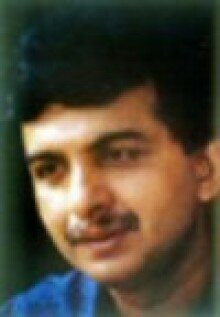
Jayant Kaikini is regarded as one of the most significant of the younger writers in Kannada today. He is a writer of short stories, film scripts and poetry, and is based in Bangalore. His poetry is characterised by subtle imagism, a minute documentation of the seemingly commonplace, a colloquial idiom and a conscientious refusal to engage in any poeticising. He has so far published six anthologies of short stories, four books of poetry, three plays and a collection of essays.
Kaikini was born in Gokarn, an idyllic beach town of coastal Karnataka. His father, Gourish Kaikini, a schoolteacher, was an eminent Kannnada litterateur and mother Shanta, a social worker. After a Masters in Biochemistry from Karnataka University, Dharwad, he moved to Bombay where he worked as a production chemist for 23 years. He shifted to Bangalore in 2000 where he worked as an adviser to a television channel and as an editor of a literary monthly, Bhavana. He is currently active in writing film scripts and hosting television talk shows.
Kaikini received the Karnataka Sahitya Academy award for his first poetry collection at the age of nineteen in 1974. He received the same award again in 1982, 1989 and 1996 for his short story collections. He has been awarded the Dinakar Desai award for his poetry, the B. H. Sridhar award for fiction, as well as the Katha National award and Rujuwathu trust fellowship for his creative writing.
In an introduction to Dots and Lines, an English translation of Kaikini’s short stories, critic C.N. Ramachandran writes, “To understand Jayant’s works, we have to situate him in the literary context of the last two decades of the 20th century. During that period, there arose a group of writers who consciously differed from both the earlier Modernist writers (called Navya in Kannada) and those contemporaneous to them, the Writers of Protest (called Bandaya in Kannada) and Dalit writers. They did not subscribe to any particular philosophical or political system of thinking – be it Existentialism of the Modernists or the Leftist ideologies of the Dalit and Protest writers. On the other hand, what they wished to do was to select precise and authentic details of daily life and organise them in such a way as to culminate in a particular experience . . . Generally, their style was comic-ironic; and the language they used was the spoken language of day-to-day life. They were neither idealists nor cynics; they just wished to observe the life around them – generally mediocre – to register all the fleeting details that marked an ordinary man’s daily routine, and lead up to an experience rich in connotations. Jayant was a major figure in this group of writers who, loosely, can be called ‘post-modernist’.”
The selection of poems in this edition brings to my mind a certain affinity with the work of the late bilingual poet, Arun Kolatkar. There is a similar use of an incisive non-decorative idiom, a keen observation of the singular, the quotidian and the unremarkable, as well as the faith that in an unwavering attention to detail is implicit the larger picture.
Consider the wonderful accumulation of images in ‘Button Rabbit’: the “sour faced tempo”, the cot “in a yogic trance” and the cloth rabbit which provokes a tangential speculation on the life of the humble seamstress who created it. Nothing prepares you, however, for the sudden centripetal movement at the end of the poem when in a miraculous moment of unfettered volition the rabbit breaks free of its glass cage and “leaps out of the tempo into the street/ in search of its creator”. From a household in transit to the existential quest of a toy rabbit – one is carried along by the inexorable logic of the poem. This is the strength of Kaikini’s poetry.
Bibliography
Poetry
Rangadindostu doora. Akshara Prakashana, Sagar, Karnataka 1974.
Kotitirtha. Akshara Prakashana, Sagar, Karnataka 1982.
Shravana Madhyahna. Akshara Prakashana, Sagar, Karnataka 1987.
Neelimale. Patrike Prakashana, Bangalore 1997.
Links
In English
Indialog Publications
About Dots and Lines, Kaikini’s book of short fiction translated by Vishvanath Hulikal.
NDTV.com – Book Reading Room
An extract from Kaikini’s Dots and Lines.





